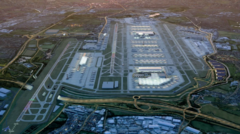Will Heathrow's £49 Billion Expansion Transform Travel?

Heathrow Airport's Ambitious Expansion Plans: A Comprehensive Overview
Heathrow Airport, one of the busiest airports in the world, has unveiled an ambitious plan to expand and modernize its facilities at a staggering cost of £49 billion. This comprehensive initiative comes amid increasing pressure on the airport's current infrastructure, which is reportedly operating at full capacity. CEO Thomas Woldbye asserts that this expansion is urgent, as it directly impacts trade and connectivity for the UK. The proposed expansion includes the construction of a third runway, a new terminal, and significant upgrades to existing infrastructure. However, these plans have ignited fierce debates regarding environmental concerns and their potential impacts on local communities.
The Rationale Behind Expansion
The expansion of Heathrow Airport is framed as a crucial step toward enhancing the UK's economic landscape. According to Woldbye, the airport's growth is expected to contribute positively to the nation's GDP by approximately 0.43%. The government has expressed support for the expansion, viewing it as a means to make Britain the "world's best connected place to do business." Chancellor Rachel Reeves emphasized the potential benefits for exporters, visitors, and local businesses, suggesting that improved connectivity would unlock billions in private investment and create numerous job opportunities.
Financial Breakdown of Expansion Costs
Heathrow's expansion is projected to cost £49 billion, divided into several key areas:
- Third Runway Construction: £21 billion, including land procurement and alterations to the M25.
- New Terminal Development: £12 billion.
- Modernization of Existing Infrastructure: £15 billion.
This comprehensive financial strategy highlights the airport's commitment to not only expanding its capacity but also enhancing the overall travel experience for passengers.
Support and Opposition: A Divided Landscape
While the expansion plans have garnered support from various business groups and airline companies, they have also faced significant opposition from environmental organizations, local politicians, and community members. The Confederation of British Industry, along with other prominent business organizations, endorsed the expansion, arguing it represents a vital investment in the UK's future. They claim that the proposed improvements will enhance access to major markets and boost domestic and international connectivity.
Environmental Concerns
Despite the economic arguments in favor of expansion, numerous environmental advocates have raised red flags about the implications of increased air traffic and its associated pollution. London’s Mayor, Sir Sadiq Khan, has voiced concerns about the potential for heightened noise and air pollution, as well as the challenges of meeting climate change targets. Critics argue that the expansion could exacerbate the UK’s existing environmental issues, with Greenpeace UK calling the justifications for expansion mere "hopeful marketing spin." They propose that any expansion should be contingent on resolving pollution concerns first.
Local Impact and Community Response
The proposed expansion has direct implications for local communities, particularly those residing near Heathrow. Residents of Harmondsworth, for example, have expressed alarm that a third runway could lead to the destruction of a third of their village. Local politicians, including members of the Liberal Democrats and the Green Party, echo these concerns, emphasizing the need for a comprehensive plan to address the potential fallout from the expansion.
Alternative Proposals: The Arora Group's Plan
In light of the ongoing debate surrounding Heathrow's plans, the Arora Group has put forth a competing proposal dubbed "Heathrow West." This alternative vision aims to expand the airport without necessitating significant alterations to the M25. The Arora Group estimates its proposal would cost under £25 billion and offer a third runway by 2035, with a phased opening for a new terminal in 2036 and 2040. The group's plans call for a shorter runway, which they argue would still meet the airport's needs without the extensive costs and disruptions associated with the current proposal.
Heathrow's Response to Criticism
Heathrow CEO Thomas Woldbye has addressed criticisms concerning the M25 alterations, suggesting that the conversation around the topic has been exaggerated. He insists that the proposed changes will lead to a safer, wider, and more efficient roadway. Additionally, Woldbye has indicated a willingness to engage in discussions regarding alternative runway lengths if they can deliver the necessary capacity to support airline operations effectively.
The Road Ahead: Government and Regulatory Review
As discussions around Heathrow's expansion continue, the government has indicated that it will carefully consider both Heathrow's proposal and the Arora Group's alternative. Transport Secretary Heidi Alexander highlighted that both proposals are significant steps toward enhancing national infrastructure, job creation, and economic growth. The government plans to review the Airports National Policy Statement in light of these developments, which could shape the future of aviation in the UK.
Historical Context: Previous Expansion Attempts
Heathrow's expansion saga is not a new story. Past attempts to build a third runway have faced numerous challenges, including legal disputes and changing political climates. Historical attempts during the Gordon Brown and Theresa May administrations encountered significant obstacles, raising questions about the viability of the current expansion plans. While having interested bidders is a positive step, delivering on these ambitious proposals remains the most challenging aspect of the process.
Conclusion: A Balancing Act of Growth and Responsibility
Heathrow Airport's expansion plans are emblematic of the broader tensions between economic growth and environmental responsibility. While the potential benefits to the UK economy are clear, the concerns raised by environmental advocates and local communities cannot be overlooked. As discussions progress, it is imperative for stakeholders to strike a balance that considers both the economic imperatives and the sustainability of the environment. Will Heathrow's expansion ultimately provide the connectivity needed to enhance trade and tourism, or will it exacerbate existing environmental challenges? The coming months will be crucial in determining the fate of this ambitious project.
FAQs
What is the estimated cost of Heathrow Airport's expansion?
The total estimated cost of Heathrow Airport's expansion is £49 billion, which includes the construction of a third runway, a new terminal, and modernization of existing infrastructure.
How will the expansion impact the local community?
Local residents have expressed concerns that expansion, particularly the construction of a third runway, could lead to significant disruptions, including the potential destruction of homes and increased pollution levels.
What alternative proposal has been made regarding Heathrow's expansion?
The Arora Group has proposed an alternative expansion plan called "Heathrow West," which aims to build a shorter third runway without significant alterations to the M25, estimating costs to be under £25 billion.
How has the government responded to the expansion plans?
The government has expressed support for Heathrow's expansion while also indicating that it will carefully review both Heathrow's proposal and the Arora Group's alternative during the review of the Airports National Policy Statement.
As the conversation surrounding Heathrow Airport's expansion unfolds, it raises essential questions about the future of aviation, economic growth, and environmental stewardship. What do you think is the right approach for balancing these competing interests? #HeathrowExpansion #SustainableAviation #EconomicGrowth
Published: 2025-08-01 01:07:06 | Category: technology



